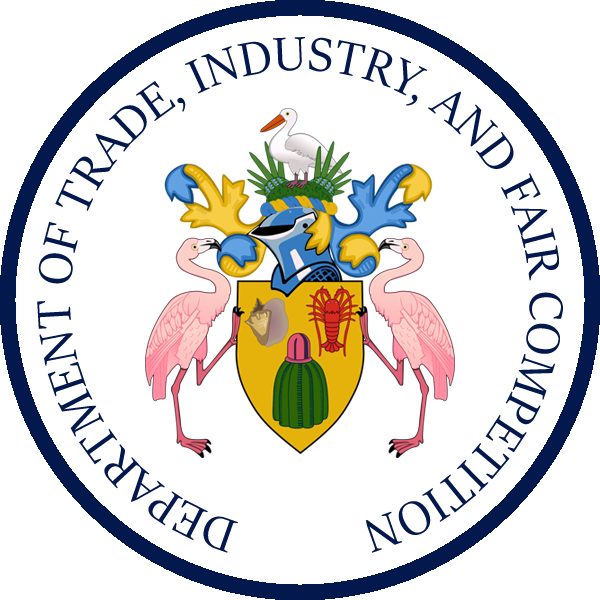Step 1: Gather Your Documents
All goods that are leaving the Turks and Caicos are subject to Customs Clearance under the Customs Ordinance (Section 42). The exportation process is similar to the importing process. However, no duties are levied on export cargo. Before a trader or individual can export from the Turks and Caicos into the world market, they must gather the necessary documents from the Customs Department to begin the process. These documents include the following:
- Cargo Manifest/Bill of Lading/Airway Bill
- Invoices
- Documents pertaining to a deceased person whose remains are being imported/exported (i.e., Photo ID, Death Certificate, Embalming Certificate, Health Certificate, Sworn Affidavit from the Mortician)
- Convention of International Trade of Endangered Species (CITES) Form completed and signed (if applicable)
- Cash Declaration Form (for cash or negotiable instruments exceeding $10,000.00 USD
- Export Stamp valued at $0.80.
Please see below the procedures to be completed for all exports from the Turks and Caicos:

Step 2: Find out about Agricultural Export Requirements (if applicable)
In the case of agriculture-based products or products that fall under the purview of the Department of Agriculture, there are specific aspects to take note of before exporting such goods from the Turks and Caicos. The trader or exporter must possess the following certificates that would allow for the smooth movement of the produce or goods out of the Turks and Caicos and into the destination country:
- All Regulated Articles: A Phytosanitary Certificate must be obtained from the Department of Agriculture before exporting.
- Pets: An authorized Sanitary Certificate must be obtained from the Department of Agriculture before exportation.
In addition, the exporter should provide the requisite application form from the relevant governmental authority in the importing country.
Step 3: Find out about Fisheries Export Requirements (if applicable)
The Turks and Caicos through the Department of Fisheries & Marine Resources (DFMRM) exports various marine natural resources to the world, such as:
- Marine Fisheries
- Water
- Coral
- Research Samples (Blood, Tissues, Sand, Sargassum etc.)
In addition to the documentation that the Customs Department requires when exporting goods from the Turks and Caicos, the Department of Fisheries & Marine Resources also requires that traders who export marine life possess the following documents:
- Export Permit: This form can be accessed by clicking on the following hyperlink - https://www.gov.tc/maritime/forms/fisheries
- Convention on International Trade in Endangered Species of Wild Fauna and Flora (CITES): This is required for both personal and industrial export, and may be sourced from the Department of Fisheries & Marine Resources
- Permits for specific CITES listed species to be used for research purposes.
There are various key aspects related to the operating and exportation of marine life within the Turks and Caicos. These would include the following:
- The commercial trade export of marine products is only permitted from a licensed Class A Processing/Export License Holder.
- A single person can export up to 10 lbs. of conch, 10 lbs. lobster, 10 lbs. fish at one time as personal export. However, the product must be carried with them as they leave the country.
- There are restrictions as to the season for export, that is, based on the marine product being exported.
- Non-consumable marine products can be exported in small quantities for personal export.
In order to maintain the population and ecosystem of the local marine life, there are fishing seasons that are applied to various marine life throughout the year. The following marine life have seasons in which they can be caught or be in possession:
- The Lobster season is closed from April 1st - July 31st each year. Absolutely no one is to have in their possession any lobster during the closed season, including restaurants within the Turks and Caicos.
- The Queen Conch export season is closed from July 16th - October 14th each year (or if the quota of 300,000 lbs. of cleaned meat & trimmings is met earlier.
- The Queen Conch catch quota (TAC) is 500,000 lbs. specifically for export and an additional 320,000 lbs. specifically for local consumption. If the 820,000 lbs. is reached prior to July 16th, the processing plants are restricted from purchasing.
- Nassau Grouper is closed for capture from December 1st - Feb 28th each year.
There is a maximum limit to the quota of Queen Conch which can be exported from the Turks and Caicos. With regards to commercial trade, the export weight of the entire Turks and Caicos fishing commercial exporters cannot surpass 300,000 lbs. of conch and trimmings in a fishing year.
APPLICATION SUBMISSION & COLLECTION METHODS
Applications and permits under the purview of the Department of Fisheries and Marine Resources can be submitted through the following methods:
- Submitting an email to fisheriesandmaritime@gov.tc
- Submitting the application physically in office of the Department of Fisheries and Marine Resources
- Export Permit application forms must be submitted to an officer of the Department of Fisheries and Marine Resources
Currently, all permits and applications that fall under the authority of the Department of Fisheries and Marine Resources can only be collected in person when visiting the physical office of the Department of Fisheries and Marine Resources. To find out about the fees for related permits and licenses, please visit the Department of Fisheries and Marine Resources website, which can be done by clicking the following hyperlink - https://www.gov.tc/maritime/ and hovering on the tab ‘FEES’ and click ‘FISHING LICENSE FEES’.
With relation to fines, the Department of Fisheries and Marine Resources can act on individuals who have been found to be breaching the regulations by seizing the cargo of the vessel as well as having the offenders pay a fine and/or face jail time. Additionally, infractions can be sanctioned by the importing country without proper permits. In this case, the products would have to be returned to the TCI at the exporter’s cost. Presently, the Department of Fisheries and Marine Resources does not charge the trader for the issuing of permits to traders or personal applications.
In the execution of its duties, the Department of Fisheries & Marine Resources works very closely with the Department of Environment & Coastal Resources (DECR). The DECR is the national authority that is takes with the overall management of the CITES process. However, the processing of CITES forms is undertaken by the Department of Fisheries & Marine Resources.
For more information concerning the exportation of marine natural resources, you may e-mail the Department of Fisheries & Marine Resources via fisheriesandmaritime@gov.tc or call them on +1(649)338-2801.
Step 4: Review Restrictions/Prohibitions/Sanctions
The Department of Customs has the right to prohibit and restrict the exportation of various goods out of the Turks and Caicos. These restrictions not only apply based on the class of the exported good but can vary in addition to the restriction of trading to various destination countries. The list of restricted & prohibited goods along with the list of restricted countries are available upon request to the Customs Department.

